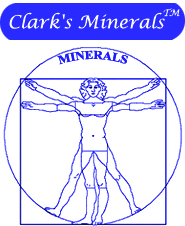












Why You Need Minerals
MINERALS are absolutely essential to good health. Some of their functions are as follows:
- BORON -- is important in calcium and magnesium metabolism and in necessary for membrane function.
- CALCIUM -- is present in greater quantity in the body than any other mineral. It builds and maintains bones and teeth. Calcium helps to regulate certain body processes such as normal nerve behavior, muscle tone and irritability, and the clotting of blood. All people need calcium throughout their lifetime.
- CHLORINE -- is very important in digestion of food in the stomach and in regulating the body's acid-base balance.
- CHROMIUM -- improves carbohydrate metabolism through facilitation of insulin activity and decreases serum cholesterol level.
- COBALT -- is a stimulant to the production of red blood cells, is a component of vitamin B12 and is necessary for normal growth and appetite.
- COPPER -- is necessary for absorption and utilization of iron, is a catalyst in the synthesis of hemoglobin. It is also a cofactor for several enzyme systems.
- FLUORINE -- helps prevent tooth decay and is important to bone structure.
- IODINE -- is essential to the health of the thyroid gland and helps to regulate the metabolic rate.
- IRON -- is an important part of compounds necessary for transporting oxygen to the cells and making use of the oxygen when it arrives.
- LITHIUM -- is essential for growth. It also helps keep the chemical balance in the brain.
- MAGNESIUM -- is found in all body tissues. It is an essential part of many enzyme systems associated with normal cardiovascular function and energy conversions in the body. It helps maintain normal blood pressure and reduction of irregular heart beat. It is required for vitamin C and calcium metabolism. It is essential for normal functioning of the nervous and muscular system.
- MANGANESE -- activates various enzymes and other minerals and is related to the proper utilization of vitamins B1 and E.
- MOLYBDENUM -- is essential in the function of two enzyme systems and is necessary in the metabolism of iron.
- NICKEL -- is necessary for the effective action of certain hormones.
- PHOSPHORUS -- is a structural component of all cells including soft tissues. It is fundamental to the growth, maintenance and repair of all body tissues, and is necessary for protein synthesis.
- POTASSIUM -- is found mainly in the fluid inside individual body cells. It helps to regulate body fluids and maintain cellular integrity. It is important in nerve transmission, heart action and for strong bones and muscles.
- RUBIDIUM -- acts as a substitute for potassium in some important physiological activities.
- SELENIUM -- plays a major role as an antioxidant and thus complements the other trace elements and vitamin E and reduces toxicity from mercury contamination. It also functions in cancer prevention and in the prevention of cardiac disorders.
- SILICON -- is essential for the proper structure and development of the skull and long bones.
- SODIUM -- works with potassium in nerve transmission and with proteins, phosphates and carbonates to keep the balance between acid and alkali in the blood. It is vital in keeping a normal balance of water in the cells and the fluids.
- STRONTIUM -- is built into bones and teeth. It may help prevent tooth decay and broken bones in older people.
- SULFUR -- is essential to life and is found in all body tissue. It is related to protein nutrition as a component of various important amino acids. It is essential for healthy skin, hair and nails. It is a component of two vitamins, thiamine and biotin.
- TIN -- is important for growth and reproduction.
- VANADIUM -- inhibits the formation of cholesterol in the body, helps prevent tooth decay and it regulates the way that fats are used by the body. Vanadium is also a part of the mechanism that surrounds the use of essential amino acids in the body.
- ZINC -- is important for insulin activity, for protein and DNA synthesis, for normal taste and wound healing, to maintain normal vitamin A levels and usage, in the structure of the bones, the immune system and in the normal oil gland function of the skin.
